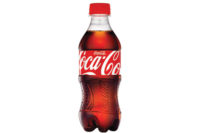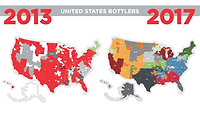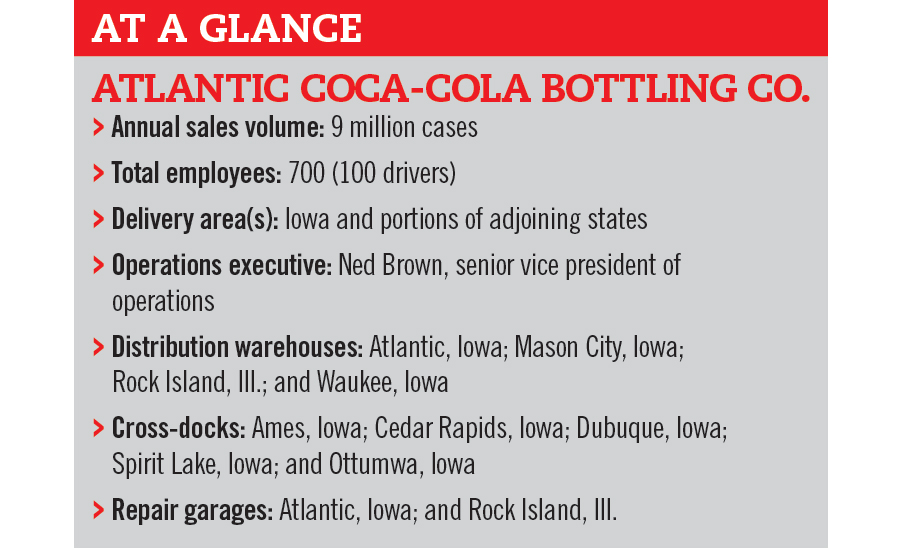Atlantic Coca-Cola Bottling’s history runs deep
Bottler acquires territories, assets from Coca-Cola Refreshments




For a family-run company that has been in the beverage business for more than a century, Atlantic Coca-Cola Bottling Co., Atlantic, Iowa, is by no means stuck in the past. Late last year, the company grew from two locations to nine, expanding its territory to cover most of Iowa and portions of adjoining states. As part of the acquisition, Atlantic also has accelerated its shift to end-load equipment, including the recent purchase of 16 new Kenworth T370 tractors and 13 new trailers.
Yet, its legacy still helps to inspire the company’s evolving operations. At a time when many distributors have opted for the cost savings of dynamic routing, Atlantic prefers the personalized customer service benefits of having each of its drivers dedicated to a fixed route. Another important tradition at Atlantic is maintaining a family culture in the workplace.
Atlantic’s roots in the refreshment business were planted when Frank P. “Perk” Tyler began an ice cream and ice business in Villisca, Iowa, around 1905. In 1909, he sold the business to sons Royal, Harry and Henry Tyler, who expanded the business in 1915 by producing a line of carbonated soft drinks named “Tyler’s Flavors.”
In 1929, the brothers acquired the franchise rights for Atlantic to bottle and distribute Coca-Cola. After selling the ice cream business to focus on soft drinks, the soft drink business was divided among the brothers in 1949, with Harry Tyler taking on the Atlantic operation.
By 1958, Harry’s son Jim was managing the company and its 16 employees who helped serve customers in a 60-mile radius of Atlantic with Coca-Cola, 7-Up and Tyler’s Flavors products. Growth continued throughout the years, and, in 1981, Jim’s son, Kirk Tyler, was placed in charge of sales. He subsequently was named president in 1991.
The most recent growth came last year following ongoing efforts by Coca-Cola Refreshments (CCR) to re-franchise half of its company-owned U.S. bottler-delivered volume by the end of 2017. In each territory, bottlers gained exclusive rights for sales and distribution, along with the CCR-held sales and distribution assets.
While Kirk Tyler runs Atlantic’s day-to-day business, Jim Tyler remains active as the company’s chairman — and has even been known to hop behind the wheel to make a delivery, keeping in touch with the core of the business. Senior Vice President of Operations Ned Brown oversees Atlantic’s fleet.
Adding to the complexity, Brown and his team had to “turn on a dime” when that debut day was moved up by 30 days. Some of the trucks had only just left the detailing shop on the day they went into service, but the Atlantic team and their vendors hit the mark.
Although Atlantic already had a mixed fleet of side-load and end-load equipment, much of the CCR equipment that came with the acquisition, as well as the recently delivered new equipment, fell under a preferred spec developed by CCR for maximum productivity and flexibility. This spec calls for a single-axle tractor and a 35-foot bulk/cargo-style, tandem-axle trailer equipped with a lift gate.
Usually, the trailer is spec’ed shorter in height — 12-feet 6-inches overall — than typical freight trailers. With this configuration, the second trailer axle provides extra stability when there’s a heavy load on the lift gate, and the extra length — compared with a standard 28-foot single-axle pup trailer — readily accommodates a full day’s deliveries.
Although Brown adopted the key elements of CCR’s specs on his latest equipment order, he added a few of his own options. What appears to be a refrigeration unit on the front of the trailer actually is a heater that is used to keep product from freezing when parked outside during the night.
Winter weather also is a spec’ing factor for the appearance of the trailers. Due to the corrosion caused by road de-icing chemicals, Atlantic has long opted for a polished stainless-steel finish with a vinyl wrap on many of its trailers, which has become a recognizable element of the company’s image.
Brown has found that the vinyl wrap also withstands corrosion better than painted finishes. “It’s nearly impossible to keep paint from getting corroded around the rivets and chipping off,” Brown says. “The wrap lasts about as long as the paint job and it’s cheaper, so we’re wrapping more of them.”
Brown notes that the family culture throughout the work place also resonates with the warehouse and fleet workers.
“When I first started at Atlantic, our chairman, Jim Tyler, had his own tractor and he would occasionally get out of the office to haul some loads,” he says. “It’s been a plus for those guys who are driving the trucks every day to work for someone who used to drive one. It’s easier to ask for polished aluminum wheels or a little longer sleeper bunk, tricking out the equipment a bit more. It’s a nice billboard going down the highway. We have compliments on a lot of our fleet as a result of it.” BI
Looking for a reprint of this article?
From high-res PDFs to custom plaques, order your copy today!







